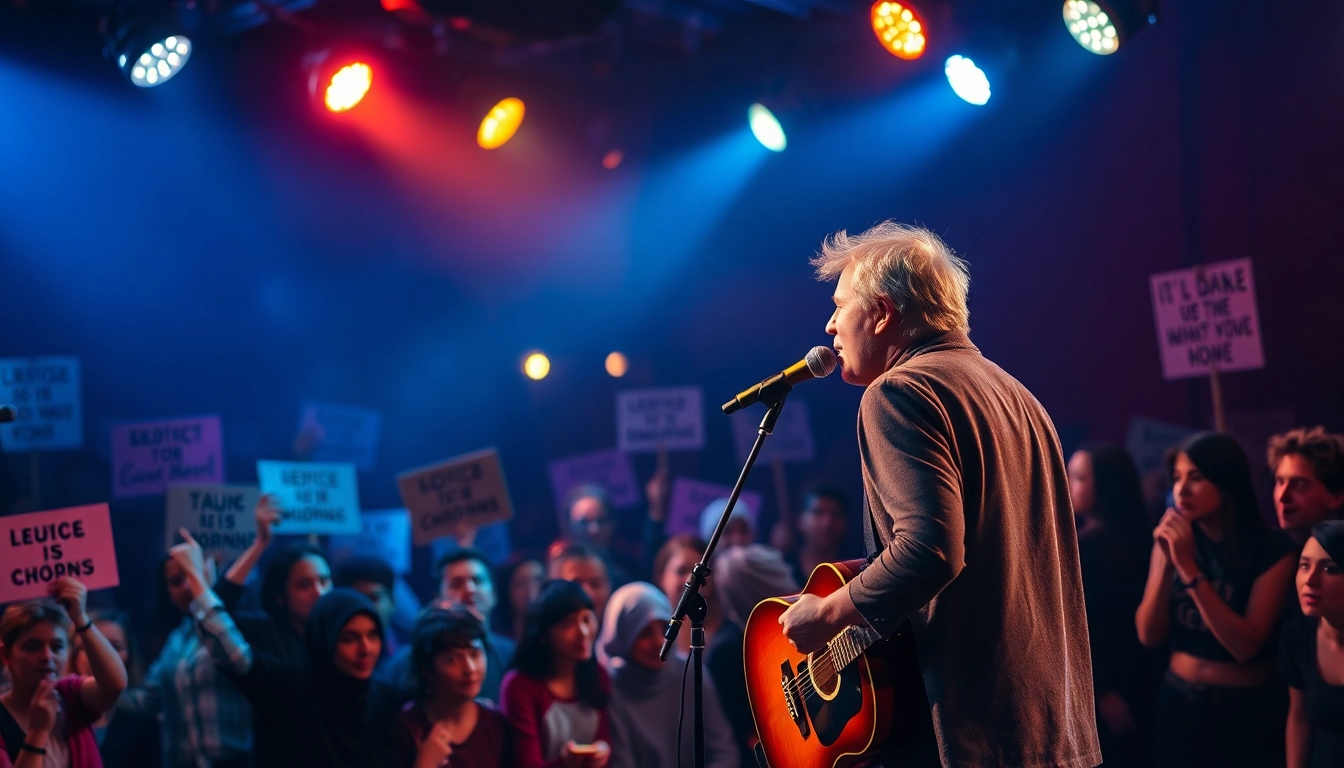Understanding Social Commentary in Music
Definition and Scope of Social Commentary
Social commentary in music refers to the exploration and critique of societal issues and cultural phenomena through lyrics and sound. This genre of music serves as a reflective mirror to society, showcasing the challenges, injustices, and triumphs experienced by various communities. Artists often wield their creative talents as platforms to provoke thought, inspire change, or simply document the human experience. The scope of social commentary transcends mere entertainment; it fosters dialogue about pertinent issues in society, encouraging listeners to contemplate and engage with the subjects presented.
From the protest songs of the 1960s to today’s hip-hop anthems, music has always played a pivotal role in shaping perceptions and inciting movements. Social Commentary in this context is not only an act of artistic expression but also a political and social act, sparking discourse that can shape collective consciousness.
Historical Context and Evolution
The roots of social commentary in music can be traced back centuries, with folk songs and spirituals addressing social injustices and the human condition. During the civil rights movement, artists such as Bob Dylan and Joan Baez used their platforms to raise awareness and mobilize support for the cause. The evolution of genres, from blues to punk rock to hip-hop, demonstrates how artists have adapted their messaging to remain relevant across generations.
In the late 20th and early 21st centuries, social commentary has transitioned into a multifaceted phenomenon. Today, it is not confined to any single genre or format but exists across pop, rock, R&B, and even electronic music. The Internet and social media have provided new avenues for artists to express their thoughts, reach wider audiences, and participate in global conversations on issues such as climate change, racial inequality, and gender rights. This evolution showcases the dynamic nature of music and its ability to reflect and shape our societal landscape.
Importance in Today’s Society
In an era rife with social dilemmas, the importance of music as a tool for social commentary cannot be overstated. As traditional media outlets often struggle to provide nuanced perspectives on complex issues, musicians have stepped into the void, offering insights that resonate with listeners on personal and collective levels. Through their art, they highlight the experiences of those often marginalized and elevate discussions that may otherwise go unnoticed.
Moreover, social commentary through music encourages activism and engagement among audiences. Songs can inspire listeners to reflect on their values, challenge societal norms, and take action toward social change. The viral nature of social media further amplifies the reach of these messages, allowing them to transcend borders and foster a global sense of solidarity.
Key Themes in Musical Social Commentary
Political Issues Reflected in Music
Political themes in music often reflect the tension and turmoil of the times. From the punk rock movement protesting against government policies to contemporary artists like Kendrick Lamar tackling systemic racism, political messages are embedded in the fabric of musical expression. This aspect of social commentary serves not only to entertain but to inform and mobilize listeners.
For instance, the lyrical content of protest songs reveals the struggles and sentiments prevalent in society, enabling artists to hold power to account. Tracks by artists like Rage Against the Machine and Public Enemy critique political systems and injustices, resonating with audiences who are dissatisfied with the status quo. Through storytelling and powerful narratives, these artists inspire change and provoke thought, reinforcing the role of music as a catalyst for political discourse.
Social Justice and Equality Messages
Social justice and equality are recurring themes within musical social commentary, as artists illuminate issues of discrimination, inequality, and the fight for civil rights. Songs like “Fight the Power” by Public Enemy and “Alright” by Kendrick Lamar serve as anthems for marginalized communities, promoting empowerment and resilience.
These tracks articulate the struggles faced by individuals from various backgrounds while fostering a sense of community among listeners who share similar experiences. The urgency and emotionality expressed in such music often drive listeners to confront uncomfortable truths about societal structures, spurring them toward engagement and advocacy.
Cultural Identity and Representation
Cultural identity plays a significant role in social commentary, as artists use their cultural backgrounds to provide insights into their experiences and perspectives. This dimension allows for the celebration of diversity and the contestation of dominant narratives that often marginalize minority voices.
For example, artists like Shakira and Cardi B draw on their heritage to highlight the richness of their cultures while tackling broader societal issues. Their music not only entertains but also educates audiences about the nuances of cultural identity, underscoring the importance of representation in the music industry and beyond.
Influential Artists Driving Social Commentary
Case Studies of Notable Musicians
Throughout history, numerous artists have emerged as pivotal figures in the realm of social commentary. Bob Dylan’s “The Times They Are A-Changin'” serves as a timeless example of music that reflects societal changes and calls for unity in the face of adversity. Similarly, Nina Simone’s “Feeling Good” resonates deeply with themes of liberation and empowerment, embodying the spirit of the civil rights movement.
In contemporary music, artists like Billie Eilish and Hozier use their platforms to address mental health issues and the climate crisis, respectively. Their ability to weave personal experiences into broader social themes sets them apart as influential voices in the current landscape of musical social commentary. By accessing personal narratives, they forge connections with listeners who may face similar challenges, reinforcing music’s potential for empathy and understanding.
Impact of Lyrics and Visuals
The role of lyrics in social commentary cannot be understated. Powerful, evocative lyrics often encapsulate the sentiment of a generation, providing words to experiences that listeners may struggle to articulate. Moreover, visuals play a significant role in enhancing the message, whether through music videos, album art, or live performances. When combined, compelling lyrics and visuals create a multifaceted narrative that amplifies social commentary.
For example, the music video for Childish Gambino’s “This Is America” starkly contrasts upbeat rhythms with jarring imagery, driving home the song’s message about gun violence and systemic racism. Such impactful pairings hold audiences captive, ensuring that the message lingers long after the music stops. Artists who understand this synergy can effectively communicate complex social issues, making their art resonate on deeper emotional levels.
Public Reception and Critical Analysis
The reception of socially charged music often reflects broader societal attitudes toward the issues being addressed. Artists who tackle sensitive subjects may face backlash or be praised for their boldness, shaping their career trajectories and public personas. Critical analysis of their work can also provide valuable context about the societal impact of their messages.
The critical response to Beyoncé’s “Formation,” for instance, sparked widespread discussion about race, feminism, and the role of the music industry in addressing these topics. Through an exploration of such responses, one can appreciate the power of music as a vehicle for social change, indicating how audiences engage with and interpret social commentary across different demographic lines.
Creating Your Own Social Commentary in Music
Writing Authentic Lyrics with Purpose
For aspiring musicians, writing lyrics that serve as social commentary entails authenticity and purpose. Artists should strive to convey their truths, ensuring that their words reflect genuine experiences and beliefs. Start by identifying issues that resonate personally or collectively, gathering inspiration from daily observations or historical events that impact lives.
When crafting lyrics, consider employing storytelling techniques and vivid imagery to engage listeners’ emotions. Authenticity in songwriting fosters connections with audiences, making them more receptive to the underlying messages. Art must be rooted in sincerity to resonate and inspire meaningful reflections in the listener.
Incorporating Personal Experiences
Integrating personal experiences into music enhances the relatability and depth of social commentary. By weaving their narratives into broader societal themes, artists can establish a bond with their audience that reflects shared experiences. This approach not only humanizes the issues addressed but also underscores the importance of individual stories in understanding collective social challenges.
Artists like Taylor Swift often draw from personal experiences in their songwriting, providing insight into their lives that resonate with fans. For emerging songwriters, leveraging their unique backgrounds and encounters can create standout pieces that speak to listeners on various levels.
Musical Styles That Amplify Messages
The choice of musical style is crucial when creating social commentary, as different genres elicit distinctive emotional responses. For example, the raw energy of punk rock or the rhythmic storytelling of hip-hop can powerfully underscore urgent messages, drawing listeners in and initiating dialogue.
Artists must select styles that align with the core message they wish to convey. A somber ballad may fit a reflective theme, while an upbeat anthem might be more suitable for a call to action. Experimenting with various genres and musical elements can also enhance the overall impact of the commentary, allowing artists to engage a broader audience.
Measuring the Impact of Social Commentary in Music
Audience Engagement and Response
Measuring the impact of social commentary starts with understanding audience engagement. This can include analyzing streaming metrics, social media interactions, and ticket sales for concerts. Listening to fans’ feedback and observing how they respond to themes in the music can inform the artist’s direction and effectiveness.
Moreover, the conversations sparked by socially conscious music can often be seen in online forums and social networks. The interplay between music and audience response plays a crucial role in determining the success and reach of social commentary, shaping the discourse around important topics in society.
Setting Industry Trends
Trends in social commentary can significantly influence the music industry as a whole. When artists successfully integrate social themes into popular music, it encourages other musicians to explore similar subjects. This ripple effect can lead to an abundance of music that provides social insights and serves as a commentary on contemporary issues.
Historically, social movements have shaped musical trends. The rise of hip-hop in the 1980s and 1990s brought forth a narrative-driven genre that challenged conventional storytelling in music. Understanding these trends can help emerging artists navigate the landscape, using social commentary to establish their artistry while engaging audiences authentically.
Long-Term Effects on Society and Culture
Ultimately, the power of social commentary in music extends beyond immediate engagement; it can leave long-lasting impacts on society and culture. Songs that address significant issues often serve as cultural touchstones, inspiring future generations of artists and activists. They document historical contexts, preserve memories, and provide a soundtrack to the social movements that shape our lives.
By analyzing the long-term effects of socially minded music, one can observe its enduring influence on public opinion, policy changes, and activism efforts. As such, artists have a unique responsibility to harness their platforms for positive change, using their music to contribute to a more equitable and just society.



